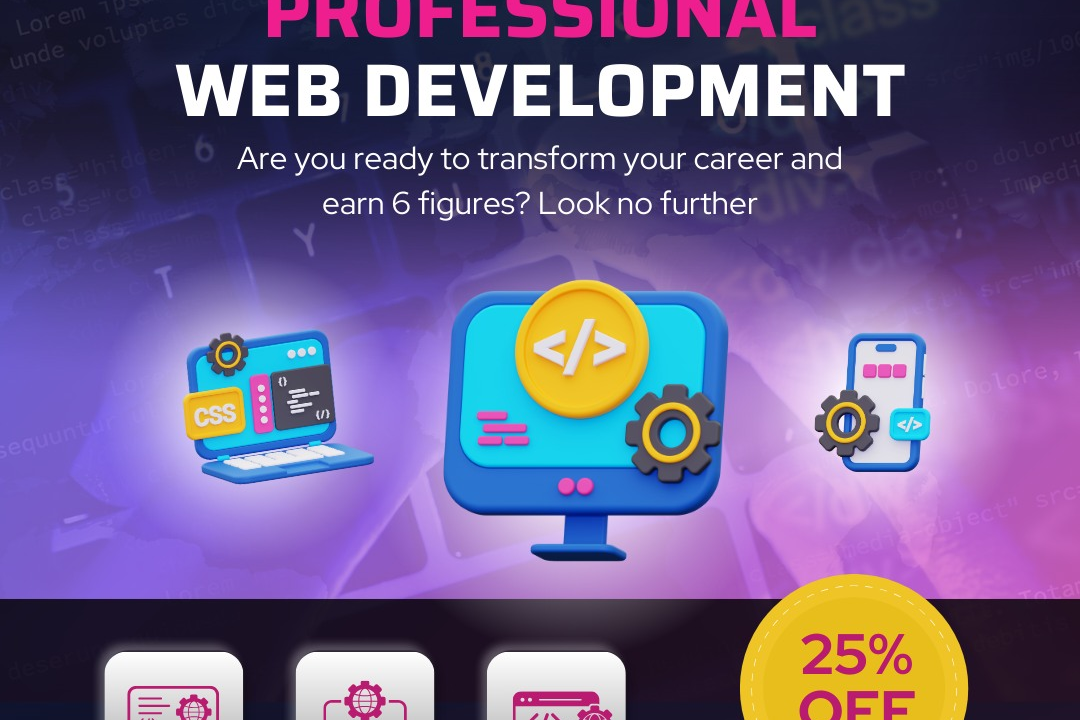Selenium Training Agenda
The Selenium training agenda at JustAcademy provides a structured learning path for individuals look
Selenium Training Agenda
The Selenium training agenda at JustAcademy is designed to equip participants with the essential skills to automate web application testing effectively. By covering fundamental concepts, practical applications, and advanced techniques, the curriculum empowers learners to enhance their software testing efficiency and accuracy. The hands-on projects integrated into the training allow students to apply their knowledge to real-world scenarios, fostering a deeper understanding of test automation best practices. This training not only prepares individuals for in-demand roles in quality assurance but also ensures they are well-versed in industry-leading tools and methodologies, making them valuable assets to any development team.
To Download Our Brochure: https://www.justacademy.co/download-brochure-for-free
Message us for more information: +91 9987184296
The Selenium training agenda at JustAcademy is designed to equip participants with the essential skills to automate web application testing effectively. By covering fundamental concepts, practical applications, and advanced techniques, the curriculum empowers learners to enhance their software testing efficiency and accuracy. The hands on projects integrated into the training allow students to apply their knowledge to real world scenarios, fostering a deeper understanding of test automation best practices. This training not only prepares individuals for in demand roles in quality assurance but also ensures they are well versed in industry leading tools and methodologies, making them valuable assets to any development team.
Course Overview
The Selenium Training Agenda at JustAcademy is a comprehensive program designed to provide participants with the skills and knowledge necessary for effective web application testing automation. Covering foundational concepts such as Selenium WebDriver, TestNG, and integration with various programming languages, the course delves into real-time projects that simulate practical scenarios. Learners will gain hands-on experience in creating, executing, and managing automated test scripts, understanding common testing frameworks, and employing best practices in test automation. By the end of the course, participants will be equipped to tackle complex testing challenges and enhance their capabilities in the rapidly evolving field of software quality assurance, preparing them for successful careers in automation testing.
Course Description
The Selenium Training Agenda at JustAcademy is designed for aspiring automation testers who want to master the art of web application testing. This comprehensive course covers key concepts and tools, including Selenium WebDriver, TestNG, and various programming languages, focusing on real-time projects that provide practical experience. Participants will learn to create, execute, and manage automated test scripts, explore common frameworks, and implement best practices in test automation. By the end of this training, learners will be well-prepared to tackle industry challenges and excel in the field of software testing, equipping them with the skills needed to advance their careers.
Key Features
1 - Comprehensive Tool Coverage: Provides hands-on training with a range of industry-standard testing tools, including Selenium, JIRA, LoadRunner, and TestRail.
2) Practical Exercises: Features real-world exercises and case studies to apply tools in various testing scenarios.
3) Interactive Learning: Includes interactive sessions with industry experts for personalized feedback and guidance.
4) Detailed Tutorials: Offers extensive tutorials and documentation on tool functionalities and best practices.
5) Advanced Techniques: Covers both fundamental and advanced techniques for using testing tools effectively.
6) Data Visualization: Integrates tools for visualizing test metrics and results, enhancing data interpretation and decision-making.
7) Tool Integration: Teaches how to integrate testing tools into the software development lifecycle for streamlined workflows.
8) Project-Based Learning: Focuses on project-based learning to build practical skills and create a portfolio of completed tasks.
9) Career Support: Provides resources and support for applying learned skills to real-world job scenarios, including resume building and interview preparation.
10) Up-to-Date Content: Ensures that course materials reflect the latest industry standards and tool updates.
Benefits of taking our course
Functional Tools
1 - Selenium WebDriver
Selenium WebDriver is the core component of the automation suite that participants will learn to use extensively. It allows testers to create robust browser based regression automation suites and tests. Students will gain hands on experience in writing test scripts to navigate web applications, interact with page elements, and validate expected outcomes. WebDriver supports multiple programming languages, such as Java, C#, and Python, enabling students to choose their preferred development environment. The flexibility and cross browser compatibility of Selenium WebDriver make it a vital tool in any test automation project.
2) Selenium IDE
Selenium Integrated Development Environment (IDE) is a user friendly tool that allows students to record and playback tests. This feature is particularly beneficial for beginners who grasp the fundamentals of automated testing without extensive coding knowledge. The IDE facilitates the creation of simple test cases quickly and helps to demonstrate Selenium's capabilities to stakeholders. Participants will learn to export recorded tests into various programming languages for further refinement and integration into more complex test automation frameworks.
3) TestNG
TestNG is an open source testing framework inspired by JUnit, designed for test automation. In the Selenium Training Agenda, students will explore how TestNG enhances test management by enabling annotations for defining test methods, grouping tests, and implementing data driven testing. Participants will learn to create comprehensive test suites and leverage features such as parallel test execution for improved efficiency. The integration of TestNG with Selenium provides a powerful combination for managing and executing complex test cases seamlessly.
4) Maven
Maven is a build automation tool essential for managing dependencies in Java projects. In the Selenium course, students will understand how to configure Maven to streamline the project setup process, ensuring all necessary libraries and dependencies are automatically downloaded. This lesson will enable participants to focus more on developing their test scripts rather than struggling with configuration issues. By using Maven, students will learn how to create a structured project layout, making their automation frameworks scalable and maintainable.
5) Cucumber
Cucumber is a key tool for Behavior Driven Development (BDD) that enhances collaboration between technical and non technical stakeholders. This framework allows students to write test cases in natural language, making it easier for everyone on the team to understand the testing process. During the training, participants will learn how to integrate Cucumber with Selenium for automated acceptance testing. This integration empowers testers to create workflows based on business requirements, ensuring that the application meets user expectations.
6) Jenkins
Jenkins is a leading open source automation server that facilitates Continuous Integration (CI) and Continuous Deployment (CD) practices. In the Selenium Training Agenda, students will delve into automating the execution of Selenium tests through Jenkins jobs. This session will cover setting up a CI pipeline, where test scripts are automatically run upon code changes, helping teams identify issues early in the development cycle. Participants will learn to generate reports and notifications, enhancing the efficiency of their testing processes and facilitating faster releases.
7) Page Object Model (POM)
The Page Object Model design pattern is a best practice for organizing test automation code in an efficient and maintainable manner. In this section of the training, participants will learn how to create Page Object classes that encapsulate the properties and behaviors of each web page in their applications. This structure promotes code reusability, reduces duplication, and simplifies test maintenance. Students will practice implementing POM to enhance the organization of their test cases, making them easier to understand and manage.
8) API Testing with REST Assured
As web applications increasingly adopt microservices architecture, API testing has become crucial. This module introduces participants to REST Assured, a Java library for testing RESTful web services. Students will learn to create automated tests for API endpoints, validate responses, and check for data integrity. This knowledge will empower testers to ensure that the backend services of their applications function correctly, complementing their GUI testing efforts.
9) Performance Testing Fundamentals
Understanding performance testing is essential for delivering high quality applications. This section covers the basics of performance testing, including load testing, stress testing, and scalability testing. Students will be introduced to tools like JMeter and learn how to create performance test scripts, analyze results, and identify bottlenecks in their applications. This knowledge will help participants understand how to ensure that their applications can handle expected user loads effectively.
10) Cross Browser Testing Strategies
With the diversity of web browsers available today, ensuring that applications perform consistently across all platforms is vital. This module covers best practices for cross browser testing, including the use of cloud services like BrowserStack and Sauce Labs. Participants will learn how to set up and execute tests across different browsers and devices, enabling them to deliver a seamless user experience regardless of the user's choice of browser.
11 - Mobile Testing with Appium
As mobile applications continue to gain popularity, understanding mobile testing is essential for testers. In this section, students will learn about Appium, an open source tool for automating mobile applications on both Android and iOS platforms. Participants will explore how to set up Appium, write test scripts, and integrate mobile tests with their existing Selenium frameworks. This knowledge will expand their testing skills into the rapidly growing mobile domain.
12) Test Automation Strategy and Best Practices
Developing a robust test automation strategy is pivotal for successful testing initiatives. This module will cover the criteria for selecting test cases to automate, establishing frameworks, and defining success metrics. Students will learn about different testing approaches, including keyword driven, data driven, and behavior driven testing, and best practices for achieving effective test automation workflows. By the end of this section, participants will be equipped with the knowledge to create a well defined test automation roadmap.
13) Debugging and Troubleshooting Techniques
Debugging is an essential skill for any tester working with automation frameworks. In this part of the training, participants will learn effective debugging techniques to identify and resolve issues in their Selenium test scripts. Students will explore tools, browser developer tools, and a variety of logging practices to facilitate smooth troubleshooting processes. This knowledge will reduce test failures and enhance overall test stability.
14) Version Control with Git
Using version control systems is fundamental for collaborative software development and test automation projects. In this module, students will gain hands on experience with Git—the most widely used version control system. Participants will learn about branching strategies, pull requests, and merging code, enabling them to work effectively in teams. Integrating Git with CI tools like Jenkins for automated deployment will also be covered, allowing testers to contribute seamlessly to the development cycle.
15) Real Time Project Work
To solidify the theoretical knowledge gained throughout the training, students will work on a real time project that encompasses all aspects of the skills learned. This hands on experience will include setting up test environments, designing test strategies, and executing tests in a collaborative team setting. Participants will have the opportunity to apply their skills in a practical context, preparing them for real world test automation challenges and boosting their confidence as they transition into the job market.
These additional points will provide a comprehensive understanding of Selenium and enhance the effectiveness of the training program offered by JustAcademy, giving students the tools needed for real world application and success in the field of test automation.
Browse our course links : https://www.justacademy.co/all-courses
To Join our FREE DEMO Session: Click Here
This information is sourced from JustAcademy
Contact Info:
Roshan Chaturvedi
Message us on Whatsapp: +91 9987184296
Email id: info@justacademy.co












